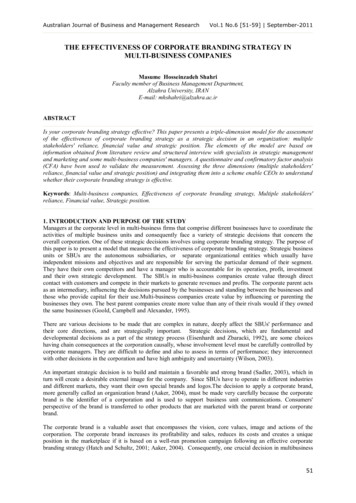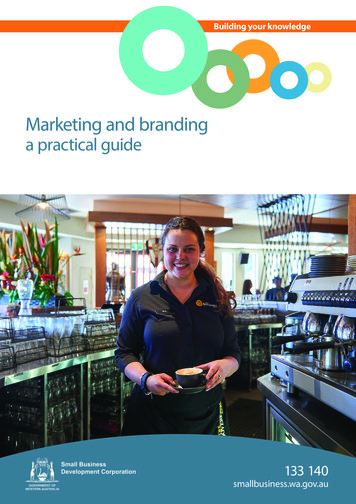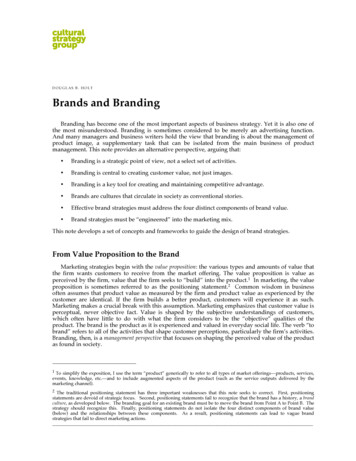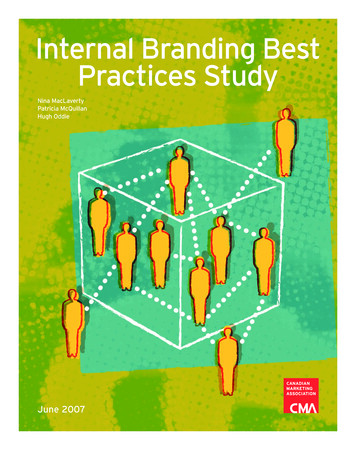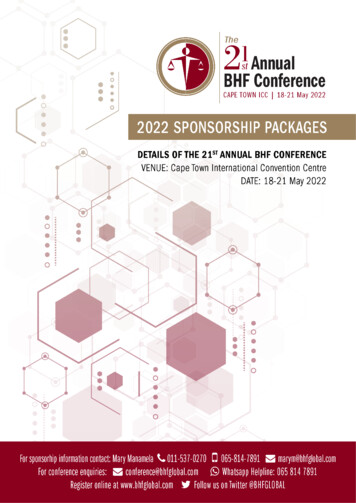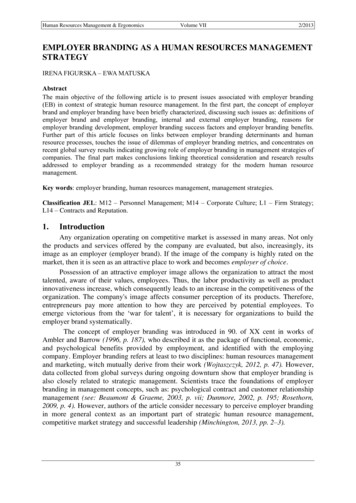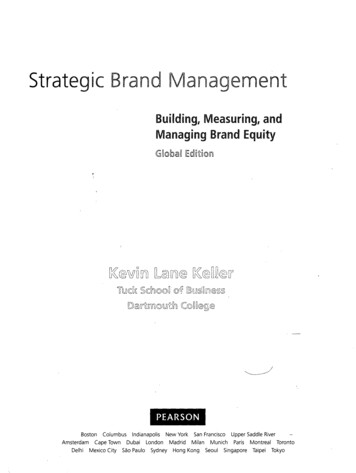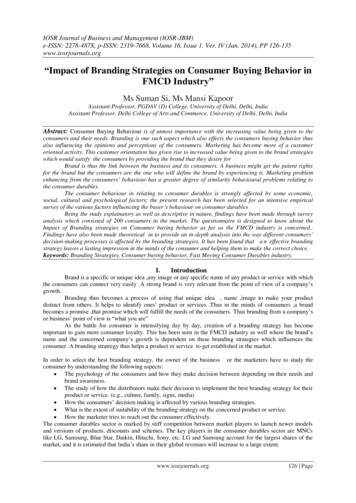
Transcription
Nation Branding
This page intentionally left blank
Nation BrandingConcepts, Issues, PracticeKeith DinnieAmsterdam Boston Heidelberg London New York OxfordParis San Diego San Francisco Singapore Sydney TokyoButterworth-Heinemann is an imprint of Elsevier
Butterworth-Heinemann is an imprint of ElsevierLinacre House, Jordan Hill, Oxford OX2 8DP, UK30 Corporate Drive, Suite 400, Burlington, MA 01803, USAFirst edition 2008Copyright 2008 Elsevier Ltd. All rights reservedNo part of this publication may be reproduced, stored in a retrieval systemor transmitted in any form or by any means electronic, mechanical, photocopying,recording or otherwise without the prior written permission of the publisherPermissions may be sought directly from Elsevier’s Science & Technology RightsDepartment in Oxford, UK: phone ( 44) (0) 1865 843830; fax ( 44) (0) 1865 853333;email: permissions@elsevier.com. Alternatively you can submit your request online byvisiting the Elsevier web site at http://elsevier.com/locate/permissions, and selectingObtaining permission to use Elsevier materialNoticeNo responsibility is assumed by the publisher for any injury and/or damage to personsor property as a matter of products liability, negligence or otherwise, or from any useor operation of any methods, products, instructions or ideas contained in the materialhereinBritish Library Cataloguing in Publication DataA catalogue record for this book is available from the British LibraryLibrary of Congress Cataloging-in-Publication DataA catalog record for this book is available from the Library of CongressISBN: 978-0-7506-8349-4For information on all Butterworth-Heinemannpublications visit our website at books.elsevier.comPrinted and bound in Great Britain08 09 1010 9 8 7 6 5 4 3 2 1Working together to growlibraries in developing countrieswww.elsevier.com www.bookaid.org www.sabre.org
. .Contents.PrefaceAcknowledgementsAbout the authorAbout the contributorsPART 1SCOPE AND SCALE OF NATION BRANDINGChapter 1The relevance, scope and evolutionof nation brandingCountry Case Insight – South Africa(Yvonne Johnston)IntroductionDefining ‘brand’ and ‘nation-brand’Academic Perspective: Adapting brand theoryto the context of nation branding(Leslie de Chernatony)Why countries engage in nation brandingThe evolution of nation brandingPractitioner Insight: From nation branding tocompetitive identity – the role of brandmanagement as a component of national policy(Simon Anholt)Nation-branding issues and initiativesSummaryReferencesChapter 2ixxixiiixv135131416172022233131Nation-brand identity, image and positioning35Country Case Insight – Egypt (ZAD Group)IntroductionIdentity versus imageThe facets of nation-brand identityDeconstructing nation-brand imageConceptual model of nation-brand identityand imageAcademic Perspective: Re-positioning Nepal inglobal public opinion and markets: Placebranding for sustainable economic development(Dipak R. Pant)Positioning the nation-brand3741414546495051
viContentsLiberation through modularitySummaryReferences535454Nation-brand equityCountry Case Insight – Chile (Christian Felzensztein)IntroductionAlternative perspectives on brand equityAcademic Perspective: A CRM perspective onnation branding (Francis Buttle)Sources and dimensions of NBEQSummaryReferences57596162PART 2CONCEPTUAL ROOTS OF NATION BRANDING75Chapter 4Nation branding and the country-of-origin effectCountry Case Insight – Switzerland(Martial Pasquier)IntroductionOverview of COO researchCOO and brandsCOO and servicesCOO and the product life cycleCOO and demographicsCOO and ethnocentrismPractitioner Insight: Inverting the COOeffect: How Portuguese firm Ecoterra leverages‘country-of-sell’ effect (João R. Freire)COO and social identityCOO and semiotic theoryCOO perceptions in flux over timeCombating a negative COO biasCountry Case Insight – Nevis (Elsa WilkinArmbrister)SummaryReferences77Chapter 3Chapter 5Nation branding and national identityCountry Case Insight – Russia (Vladimir Lebedenko)IntroductionFundamental features of national identityThe nation as an imagined communityInvented traditionCultural elements of national identityPractitioner Insight: Sonic branding – Capturingthe essence of a nation’s identity(Daniel M. Jackson)Attitudes and national 101105107111112116117118124126
ContentsSummaryReferencesChapter 6PART 3Chapter 7Chapter 8From country-of-origin and national identity tonation brandingCountry Case Insight – Brazil (Renata Sanchesand Flavia Sekles)IntroductionNational identity and country-of-origin: Areasof commonalityBranding’s differentiating powerPractitioner Insight: Greek olive oil – The paradoxof a product and a national icon(Anthony Gortzis)Nation branding conceptual frameworkCountry Case Insight – Germany (GianfrancoWalsh and Klaus-Peter Wiedmann)SummaryReferencesETHICAL AND PRAGMATIC ISSUESIN NATION BRANDINGEthical imperatives in nation brandingCountry Case Insight – Bolivia (Ximena AlvarezAguirre and Ximena Siles Renjel)IntroductionThe legitimacy of nation-brand managementPractitioner Insight: Smaller nations enter theglobal dialogue through nation branding(Jack Yan)Identification and selection of nation-brand valuesIs ‘brand’ acceptable?Sustainability and nation brandingSummaryReferencesPragmatic challenges to the nation-brandingconceptCountry Case Insight – Iceland(Inga Hlín Pálsdóttir)IntroductionWho needs to be involved?Coordinating nation-brand touchpointsAcademic Perspective: Corporate branddifferentiation in the financial services industry –Applying the highest central common factorconcept to nation branding (Olutayo B. Otubanjoand T.C. 165169169170172173173178179181183187187192194vii
viiiContentsNation-brand architectureA highly politicized activityCountry Case Insight – Hungary (Gyorgy Szondi)SummaryReferences197200201204205CURRENT PRACTICE AND FUTUREHORIZONS FOR NATION BRANDING207Chapter 9Elements of nation-branding strategyCountry Case Insight – Japan (Satoshi Akutsu)IntroductionPrinciples of strategyNation-brand advertisingCustomer and citizen relationship managementNation-brand ambassadorsDiaspora mobilizationNation daysThe naming of nation-brandsNation-brand tracking studiesCountry Case Insight – Estonia 228229229230230235235Chapter 10Future horizons for nation brandingCountry Case Insight – France (Philippe Favre)IntroductionA shift away from anglocentric paradigmsImproved coordination of nation-branding strategyGrowing adoption of brand management techniquesPractitioner Insight: The coming crisis in thegeography-chained market of nations(Chris Macrae)Online nation brandingIncreasing impact of consumer-generated mediaInternal nation brandingSonic nation brandingAcademic Perspective: True North (Stephen Brown)An alternative lexicon for nation branding?Soft power and public diplomacyNation branding as a driver of sustainabledevelopment and competitive paritySummaryReferences237239242242243243PART 259
. .Preface.This book has been written to make a contribution to the small but rapidlygrowing literature on nation branding. It is designed to show not onlythe ways in which conventional brand management techniques can beapplied to nations but also to provide some background depth on thecontext and nature of nation branding. Therefore, the scope of the bookencompasses wider issues related to national identity, sustainable development and political awareness, in addition to the more familiar brandingthemes of brand identity, brand image, brand positioning, brand equityand so on. This approach is intended to ensure that the theory and practice of nation branding is covered in a rich, multi-dimensional manner.The book is written for a number of audiences, each of whom willcome to the field of nation branding with their own specific interests andagenda: MBA, Masters and upper level undergraduate students studyingmarketing, branding, international business, public diplomacy andtourismGovernment and policy-makers worldwide, particularly in economicdevelopment agencies, export promotion agencies and tourismorganizationsIndividuals with an interest in how their country is perceived andthe ways in which their country is (or is not) attempting to enhanceits reputationA key feature of the book is the provision of multiple perspectives onnation branding through the inclusion of over 20 contributions from awide range of academics and practitioners. These contributions illuminatevividly the theories, concepts and frameworks that form the basis of thebook. Country case insights are offered on the nation-branding activitiesand challenges of countries as diverse as France, Japan, South Africa,Egypt, Brazil and many more. It is a key contention of this book that theprinciples of nation branding can be applied successfully by any nationwhether small or large, rich or poor, developed or emerging. The countrycase insights are designed to demonstrate this point.Many people have contributed in different ways to this book. I hopethat you will find it stimulating and thought-provoking to read. It isdesigned to act as a starting point for discussion and action, rather thanas a final statement on the topic of nation branding.Enjoy the book!Keith DinnieEdinburghwww.brandhorizons.com
This page intentionally left blank
. .Acknowledgements.First and foremost, my thanks go to Anna Fabrizio, Commissioning Editorat Elsevier Butterworth-Heinemann, whose enthusiasm for this book waskey to making it happen. Thanks also to Tim Goodfellow and Liz Burton,and all the other people at publishers Elsevier Butterworth-Heinemannfor their hard work in bringing this book to fruition.I express many thanks to all the individuals and organizations whocontributed to this book in the form of country case insights, academicperspectives and practitioner insights. Your contributions have immeasurably enriched this book.Many thanks also to colleagues and students at Edinburgh University,Glasgow Caledonian University, and Strathclyde University for numerous interesting discussions and insights into the theory and practice ofnation branding.Finally, my thanks go to my parents and my wife for their unendingsupport during the writing of this book.
This page intentionally left blank
. .About the author.Dr Keith Dinnie teaches at Temple University Japan (TUJ), Tokyo. He hasdelivered Masters and Honours level courses in various aspects of marketing and branding at the University of Edinburgh. He has also taughton the world class Strathclyde MBA programme, delivering seminars onmarketing management and brand management & strategy in the UK aswell as in international centres such as Athens, Hong Kong and Shanghai. He has lectured on a visiting basis at the University of Hanover andthe University of Koblenz, Germany, as well as conducting research andconsultancy in several countries worldwide.He has published in various journals including the Journal of CustomerBehaviour, The Marketing Review, Journal of Brand Management, Journalof General Management and Corporate Communications: An InternationalReview. As Book Review Editor for the Journal of Brand Management, hehas reviewed over 25 books on branding over the past 6 years. He wasinvited to act as Guest Editor for the Journal of Brand Management special editions on Global Branding (2005) and Nordic Brands (2008). Hisresearch and consultancy work includes projects conducted on behalf ofmarket-leading consultancies Landor Associates and Burson-Marsteller,as well as innovative research conducted into the emerging field of nationbranding amongst senior decision-makers and brand consultants on aworldwide basis. He is the founder of Brand Horizons consultancy.Email: keithdinnie@brandhorizons.com
This page intentionally left blank
. .About thecontributors.Ximena Alvarez AguirreXimena Alvarez Aguirre is former Vice-President of CABOTUR – CámaraBoliviana de Turismo (Bolivian Tourism Chamber 2002–2004) and formerVice-Minister of Tourism in Bolivia (2004–2005). Wide experience in thetourism sector of the country. Teaching experience in the Tourism areain the CEMLA – Centro Empresarial Latino Americano (Latin AmericanEntrepreneurial Center) in Cochabamba, Bolivia. Currently, she is theGeneral Director and owner of Discover the World Marketing in Bolivia,which represents several airlines from different parts of the world.First degree in Economic Science from the Bolivian Catholic University.Diploma in Tourism from CETT – Centro de Estudios Técnicos Turísticos(Technical Tourism Study Center) in Barcelona, Spain.Satoshi AkutsuSatoshi Akutsu is an Associate Professor at Graduate School of International Corporate Strategy, Hitotsubashi University in Tokyo. He receivedhis Ph.D. from the Haas School of Business at the University of California,Berkeley. He has published more than a dozen books/articles on marketing and brand management in Japanese. He is the co-author of‘A Mentality Theory of Knowledge Creation and Transfer’ in Managing Industrial Knowledge (Nonaka and Teece, eds.) and ‘BrandingCapability’ in Hitotsubashi on Knowledge Management (Takeuchi andNonaka, eds.). Professor Akutsu is an advisor to a number of companiesand has been a speaker at management conferences, seminars and workshops throughout the world. He is a member of the Task Force onContents in the Intellectual Property Policy Headquarters and a judge ofJapan PR Award by the Japan PR Association.Simon AnholtSimon Anholt is the leading authority on managing and measuring national identity and reputation. He is a member of the BritishGovernment’s Public Diplomacy Board and has advised the governments of the Netherlands, Jamaica, Tanzania, Iceland, Latvia, Sweden,Botswana, Germany, South Korea, Romania, Scotland, Croatia, Mongolia,the Baltic Sea Region, Bhutan, Ecuador, New Zealand, Switzerland andSlovenia, as well as organizations including the United Nations, theWorld Economic Forum and the World Bank. He is Founding Editor of thequarterly journal, Place Branding and Public Diplomacy. His books include
xviAbout the contributorsBrand New Justice, Brand America and Competitive Identity – The New BrandManagement for Nations, Cities and Regions. He publishes three major globalsurveys, the Anholt Nation Brands Index, City Brands Index and StateBrands Index. For further information, please see www.earthspeak.com.Stephen BrownStephen Brown is Professor of Marketing Research at the University ofUlster, Northern Ireland. Best known for Postmodern Marketing, he haswritten numerous books ranging from The Marketing Code and Free GiftInside to Wizard: Harry Potter’s Brand Magic. He is currently working onAgents & Dealers, a prequel to The Marketing Code.Francis ButtleDr Francis Buttle is Director of two Australian-based organizations –Francis Buttle & Associates (www.buttleassociates.com) and ListeningPost (www.listeningpost.com.au). He was formerly full Professor of Marketing and Customer Relationship Management at three of the world’stop 40 graduate schools of management. He is author of the book Customer Relationship Management: Concepts and Tools and over 300 otherpublications. He can be reached at francis@buttleassociates.com.Leslie de ChernatonyLeslie de Chernatony is Professor of Brand Marketing and Director ofthe Centre for Research in Brand Marketing at Birmingham UniversityBusiness School. With a doctorate in brand marketing, he has a substantialnumber of publications in American and European journals and is aregular presenter at international conferences. He has several books onbrand marketing, the two most recent being Creating Powerful Brands andFrom Brand Vision to Brand Evaluation. A winner of several research grants,his two most recent grants have supported research into factors associatedwith high-performance brands and research into services branding. Hewas Visiting Professor at Madrid Business School and is currently VisitingProfessor at Thammasat University, Bangkok, and University of Lugano,Switzerland. Leslie is a Fellow of the Chartered Institute of Marketingand Fellow of the Market Research Society. He acts as an internationalconsultant to organizations seeking more effective brand strategies andhas run acclaimed branding seminars throughout Europe, Asia, Americaand the Far East. He is an experienced expert witness in legal casesinvolving branding issues in commercial and competition cases.Philippe FavrePhilippe Favre was appointed French Ambassador for internationalinvestment, Chairman and CEO of Invest in France Agency on August24, 2006. Before this nomination, Philippe Favre, 45, was Chief of Staffto the French Trade Minister and Deputy Chief of Staff to the FinanceMinister. He also worked as Director of Human Resources, Budget andInformation Technology at the Ministry of Trade. From 1993 to 2001,
About the contributorsMr Favre was the French Trade Commissioner in Hong Kong, and laterin Taipei, Taiwan. Between these postings, he was a personal adviser forinternational affairs at the finance and trade ministries in Paris. Mr Favrewas a counselor at the French Embassy in Washington, D.C., from 1990to 1993. Earlier in his career, he worked at the Ministry of Finance inParis in charge of economic relations with the former USSR and Eastern Europe. Mr Favre has degrees from the Institut d’Etudes Politiquesde Paris and Paris University. He is also a graduate of L’Ecole Nationaled’Administration (ENA). In April 2007, he was appointed ‘Chevalier’ ofthe Legion of Honour.Christian FelzenszteinDr Christian Felzensztein, B.Com. (Honors), M.B.A., Universidad Austral de Chile. Post-graduate diploma on Local Economic Development,Weitz Center for Development Studies, Rehovot, Israel. M.Sc. and Ph.D.in International Marketing, University of Strathclyde, Glasgow, Scotland.He is founder and Managing Director of STEIN Business Center, specialized solutions in International Marketing Strategy and Professor ofInternational Marketing in the Faculty of Management and Economicsat Universidad Austral de Chile, Valdivia, Chile. He has researched andpublished in the subjects of country of origin effect in agricultural andaquaculture products as well as regional clusters and innovation. Currently, he is leading a major international research project on naturalresource-based clusters. Email: cfelzens@uach.clJoão R. FreireJoão R. Freire is a Brand Consultant for MMG Worldwide (mmgworldwide.com), a global marketing communications firm specializing in thetravel, hospitality and entertainment industry. João has recently completed his Ph.D. in Place Branding at London Metropolitan University,where he is also a guest lecturer in Marketing. His Ph.D. focused onthe analysis of the interaction between place-brands and consumers. Themain objective of his investigation was to provide a deeper understanding of the different dimensions that compose a place-brand. He is alsothe founder of Ecoterra (ecoterra.co.uk), a company specializing in thebranding and marketing of natural food products. João is an economist bytrade, who has worked in the fields of finance and marketing for severalmultinational companies in Brazil, Portugal and the UK. João is a frequent speaker and author on Branding topics. His articles have appearedin well-respected international publications such as Place Branding andJournal of Brand Management.Anthony E. GortzisAnthony E. Gortzis was born in Athens, where he studied Economicsand Law in the University of Athens. He completed his postgraduatestudies in England, concentrating in Business Administration (M.B.A.),Marketing and Econometrics. He also attended a crash course M.B.A. inxvii
xviiiAbout the contributorsHarvard University. In 1973, he was hired in the Marketing Departmentof Unilever. He worked in the Marketing Department of Unilever inLondon, as Marketing Specialist on detergents for Europe and NorthAmerica. In 1982, he became Marketing Director for Unilever detergentsin Greece. In 1986, he became Marketing Director of Elais-Unilever FoodsDivision, and in 1998, he became Public Affairs, Media and ResearchDirector for all Unilever companies in Greece. He has also been Presidentof the Greek Institute of Marketing. Since 1994, he has been a member ofthe Board of the Greek Advertisers Association, and since March 1996, hehas held the presidency. In 2000, he was elected President of the WorldFederation of Advertisers (WFA). In 2003, he was elected as the GeneralSecretary of the Board of the Chambers of Commerce for Piraeus. Sincethe beginning of 2003, he has been active as a consultant in the areaof Media, Marketing and Public Relations, Public Affairs, CSR, CrisisManagement, and he is the Chairman of One-Team, a CSR, marketing andcommunication company. In April 2005, he was elected as Vice-Presidentof the Hellenic Management Association and also as a member of theboard of the Action-Aid. Since May 2005, he has acted as the Presidentof the EBEN.GR (Business Ethics Institute).InterbrandInterbrand are a leading international branding consultancy. Interbrand’sbrand professionals serve clients globally with over 30 offices in over20 countries. Working in partnership with its clients, Interbrand combinerigorous strategy and analysis with world-class design and creativity.Interbrand’s services include brand analytics, brand valuation, strategy,naming and verbal identity, corporate identity, packaging design, retaildesign, integrated brand communications and digital branding tools.Daniel M. JacksonDaniel M. Jackson has worked in film and music theatre production, media planning, advertising and commercial radio. He is theauthor of the groundbreaking book, Sonic Branding (Palgrave Macmillan,2004).Yvonne JohnstonYvonne Johnston is the Chief Executive Officer of the International Marketing Council of South Africa (IMC), an organization that aims to createa positive, united image for South Africa to give the country a strategic advantage in an increasingly competitive marketplace. This, it doesthrough the promotion of Brand South Africa. Its mission – to articulate a brand for South Africa, which positions the country in order toattract tourism, trade and investment, as well as realize internationalrelations objectives; to establish an integrated approach within government and the private sector towards the international marketing of SouthAfrica and to build national support for Brand South Africa. Pivotal tothe success of the work of the IMC is the realization of its mission as
About the contributorsthis will help the country deal with its socio-economic issues. The IMChas been in existence since 2000, and in her 4 years at the helm of theorganization, Yvonne is credited with raising the profile of Brand SouthAfrica to the point where it was voted amongst the Top 5 Hot Brands for2004 by Intelligence Total Business (formerly Business 2.0), an authoritative publication that offers information on next generation businesstrends, processes and insights. Another highlight was being selected asone of five finalists for the 2005 Business Woman of the Year. She iswidely respected as a leading communications strategist and has playeda major role in the training and teaching of strategic media skills in theindustry and is a much sought-after public speaker locally and abroadon Brands, as well as the current mood of our nation. Previously, she hasworked in the Advertising and Marketing industry in a career spanningover 20 years as a Media Director of leading ad agencies. For 5 years,she was Group Media Director of Ogilvy and Mather. This was followedby a stint in marketing, including running her own marketing consultancy, refreshing marketing, specializing in experiential marketing andmarketing to women. She currently sits on the boards of SA Tourism,The African Hall of Fame and The Valued Citizens.Vladimir LebedenkoVladimir Lebedenko is Deputy Director of Department for Relations withthe Subjects of the Federation, the Parliament, Public and Political Organizations, Ministry of Foreign Affairs of the Russian Federation. Graduatedfrom the Moscow State Institute of International Relations (MGIMO –University). Occupied diplomatic positions in Russian missions to Togo(Africa), France (Marseilles and Paris). In Russian Permanent Representation to the Council of Europe (Strasbourg). The author of a number ofarticles in periodicals, as well as in International Life magazine, publishedby the Ministry of Foreign Affairs of Russia. Participated in internationalconferences and seminars.Chris MacraeChris Macrae (chris.macrae@yahoo.co.uk) has, over a 30-year career,researched intangibles of marketing and organizational systems in waysinspired by his father’s Entrepreneurial Revolution trilogy published inThe Economist and Offensive Marketing Principles of Thedore Levitt andHugh Davidson. His work includes projects in 30 countries and hundreds of markets directed at databasemodelling of what innovation societies wanted nextworking in Japan, which provided insights into corporate brandingof founders built to last visionsarticles (since 1980s) on nation brands as a new arena of world classbrandsinnovating genre of living and learning how to charter brandarchitecturexix
xxAbout the contributors senior consultant on value of branding at coopers & lybrandhosting brandknowledge.com for corporate identity enterprises ofWPPChris concludes that media and global markets have lost exponentialsustainability and the transparency needed to integrate societies intoglobalization. Mathematically, sustainability investment is missing ahi-trust audit of flows and goodwill. Open-sourcing communal mapsof empowerment economics is his passion at leadership portals:http://economistclub.tv and http://www.valuetrue.com.T.C. MelewarT.C. Melewar is a Professor of Marketing and Strategy at BrunelUniversity London. He has previous experience at Warwick Business School, University of Warwick, MARA Institute of Technologyin Malaysia, Loughborough University, UK, and De Montfort University, UK. T.C. teaches Marketing Management, Marketing Communications and International Marketing on a range of undergraduate, M.B.A.and executive courses with companies such as Nestlè, Safeway, Corusand Sony. He is a Visiting Professor at Groupe ECS Grenoble, France andHumboldt University, Berlin, Germany. His research interests are globalcorporate identity, corporate branding, corporate reputation, marketingcommunications and international marketing strategy.Olutayo B. OtubanjoOlutayo B. Otubanjo is a Marketing Communications and ConsumerBehaviour tutor at Brunel University, London, where he is completinga Ph.D. focusing on ‘Organisational Construction of Corporate Identity’.He has given a number of papers on corporate identity and corporate reputation at international conferences in England and was for a few yearsan Account Executive at CMC Connect Lagos (Nigeria) where he carriedout numerous corporate identity and corporate branding assignments forleading multinational brands such as Coca-Cola, Microsoft, UPS, Peugeot,Shell, Peugeot, Accenture and many more. He holds an M.Sc. in Marketing (with emphasis on corporate identity communications), a postgraduate diploma in Marketing, another postgraduate diploma in Journalismand a B.Sc. in Accounting.Inga Hlín PálsdóttirInga Hlín Pálsdóttir is a Project Manager in consultancy and trainingwith the Trade Council of Iceland. She obtained her M.Sc. in InternationalMarketing in 2005 from the University of Strathclyde, Glasgow. Beforethat, she graduated with a B.Sc. in Business Administration in 2003 fromBifröst School of Business in Iceland, completing part of her studies inFachochschule Nordostniedersachsen in Lüneburg, Germany. Before shestarted working for the Trade Council of Iceland, she worked as a ProjectManager for Educate – Iceland and Atlantik Tours (DMS).
About the contributorsDipak R. PantDipak R. Pant, B.A., M.Phil., Ph.D., is Professor of Anthropology andEconomics, founder and head of the Interdisciplinary Unit for SustainableEconomy, Università Carlo Cattaneo, Italy. Field surveyor and sustainable development-planning advisor in Italy and abroad. Visiting professor in various European, Asian, South American and US universities.Senior Fellow, Society for Applied Anthropology, USA. Member, editorial board of Place Branding, London (UK). Born and schooled in Nepal;military training and higher education in India; post-graduate studies inEurope.Formerly: Associate Professor of Human Ecology and Anthropology,Tribhuvan University, Kathmandu (Nepal); Professor of InternationalStudies, University of Trieste (Italy) and Professor of DevelopmentStudies, University of Padua (Italy).International Research Associate, Environmental Health and SocialPolicy Center, Seattle (USA).Martial PasquierMartial Pasquier is Professor for Public Management and Marketing at theSwiss Graduate School of Public Administration IDHEAP in Lausanne.Studies at the Universities of Fribourg/CH, Berne and Berkeley. From1998 to 2003, Director of a consulting firm and lecturer at diverse Universities. Since 2003, Full Professor at the IDHEAP. Guest Professor at theUniversities of Berne, Lugano, Strasbourg, Nancy II and Paris II. Member of the Board of the Swiss Marketing Association GFM. Member ofthe Swiss Competition Commission. Research interests: Nation’s image,Marketing and Communication of Public Organizations, Transparency ofthe Public Organizations. Email: martial.pasquier@idheap.unil.chXimena Siles RenjelXimena Siles Renjel has 5 years experience in the banking industry inBolivia and Ecuador, acting as a risk analyst and relationship managerfor different industries and sectors. M.Sc. in International Marketing withDistinction from the University of Strathclyde, Glasgow, Sc
Online nation branding 246 Increasing impact of consumer-generated media 247 Internal nation branding 248 Sonic nation branding 248 Academic Perspective: . on the world class Strathclyde MBA programme, delivering seminars on marketing management and brand management & strategy in the UK as well as in international centres such as Athens, .
